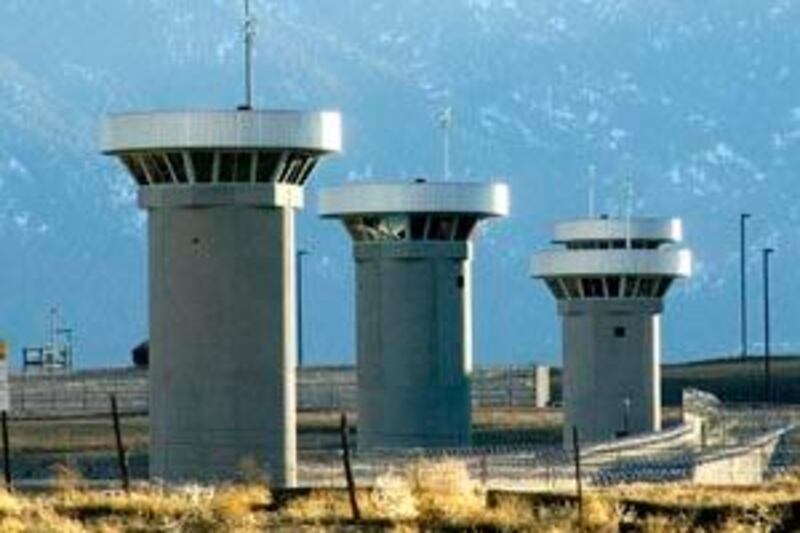DENVER // Now that the US president, Barack Obama, has ordered Guantanamo Bay closed within a year, Colorado's governor has said he would support shifting hundreds of detainees there to a maximum-security federal prison in Colorado, popularly known as the "Alcatraz of the Rockies". Many US residents applauded Mr Obama's decision to close Guantanamo, which was opened after the September 11 attacks, and which came to be seen as a symbol of the Bush administration's disregard for human rights and the Geneva Conventions.
Yet Mr Obama's decision to close the facility raises tough questions about what to do with hundreds of detainees in the "war on terror", categorised as "enemy combatants" by the Bush government, although many were never formally charged. Colorado's governor, Bill Ritter, said the US Penitentiary Administrative Maximum Facility, or Supermax, could in theory accommodate senior members of al Qa'eda currently being held on the small slip of Cuba controlled by the United States.
Supermax "is a facility designed for exactly that kind of prisoner", said Mr Ritter, who, like Mr Obama, is a Democrat. "And I don't think it is appropriate for somebody like me who has supported the president's decision to close Guantanamo Bay to say: 'not in my backyard'." Mr Ritter's comments, made on Friday to a Colorado TV station, created a storm of protest among Republican lawmakers here. They quickly responded with a petition to block the possible transfer, warning that the state could become a dumping ground for terrorists.
"The governor is wrong to encourage the president to? close the Guantanamo facility by welcoming the detainees to be incarcerated in Colorado," said Mike Coffman, a Republican policymaker. "Guantanamo needs to stay open, not only to protect Americans here at home but to protect our soldiers and marines serving in harm's way." Evan Dreyer, a spokesman for Mr Ritter, said the Obama administration has not actually proposed shifting any Guantanamo prisoners to Supermax. And for that to happen, he said, their status as military prisoners would have to be changed. "Currently the detainees at Guantanamo are categorised as military detainees," Dreyer said. "Supermax is a civilian federal prison." As the Obama administration looks for alternative facilities to house 245 Guantanamo detainees, experts say Supermax stands out as one of the most secure correctional facilities on US soil. The 15-hectare complex, located in Florence, about 145km south of Denver, houses up to 500 inmates considered the country's most dangerous convicts. It is already home to Ramzi Yousef, who was convicted in the 1993 World Trade Center bombing, Zacarias Moussaoui, the suspected 20th hijacker in the September 11 attacks and Ted Kaczynski, the man better known as the Unabomber. About one-third of the prisoners at Supermax were transferred there after they attacked or tried to attack prison guards at other correctional facilities. A further 22 per cent of the inmates killed fellow prisoners. It is not a comfy place to be interned. Most Supermax inmates spend 23 hours each day in solitary confinement, housed in 2.13 metre by 3.66 metre cells locked with heavy steel doors. Prisoners seldom see one another, and the inmates' only human interaction is with correctional officers. Religious services are broadcast from a small chapel. Some legal analysts suggest it would be inappropriate to shift to Supermax the dozens of Guantanamo inmates who are merely suspected of being guilty, but who have never been convicted by a military or civilian court. The challenge for the Obama administration, analysts said, will be finding a suitable place to detain those suspects, while also establishing a system to swiftly and openly process their cases. The American Civil Liberties Union (ACLU) of Colorado has condemned the idea of sending them directly to Supermax, saying such a move would hardly reflect an improvement in upholding the rule of law. "To release these individuals from Guantanamo Bay only to send them to the toughest prison in the country could well be considered a move out of the frying pan into the fire," said Cathryn Hazouri, the executive director of the ACLU's Colorado chapter. Proposals have been made to temporarily house the Guantanamo inmates in a military prison - perhaps US Penitentiary Leavenworth in Kansas or Camp Pendleton in California - until their cases can be processed. "Moving the Guantanamo detainees to military facilities would seem to make more sense," wrote The Denver Post in an editorial on Saturday. That would allow authorities to process their cases while the detainees are still categorised as military prisoners. Mr Ritter's spokesman said the final decision will rest with Mr Obama, who must now redefine how "enemy combatants" are held by the US government. "There are a lot of legal hurdles to get over before any of this happens," Mr Dreyer said. "Supermax is a federal facility. As state officials, we have no jurisdiction over who gets detained there." gpeters@thenational.ae






